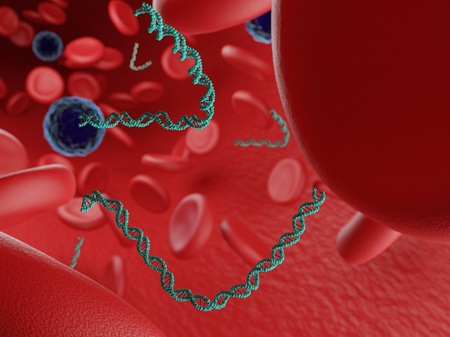Biotech firm Gene Solutions: A promising picture for multi-cancer early detection in Southeast Asia
 Image 1. Illustration of cell-free DNA in the blood stream (Shutterstock)
Image 1. Illustration of cell-free DNA in the blood stream (Shutterstock)
PR99619
HO CHI MINH CITY, Vietnam, April 25, 2023 /PRNewswire=KYODO JBN/ --
In January 2023, Vietnam's Medical Genetics Institute & Gene Solutions
(https://genesolutions.com/) published their research paper on Cancer
Investigation: Clinical validation of a ctDNA-based assay for multi-cancer
detection: an interim report from a Vietnamese longitudinal prospective cohort
study of 2,795 participants.(*)
Circulating tumor DNA, or cell-free tumor DNA (ctDNA) assay is based on
detecting the appearance of ctDNA in blood. This method is sometimes called
Liquid Biopsy as it only requires blood sample collection, rather than tumor
tissues. Theoretically, all cells release their cell-free DNA in the blood
stream, including tumor cells. The characterization and sequencing ability to
detect these ctDNA have been applied into multiple purposes including profiling
tumor mutations, monitoring treatment responses, especially early cancer
detection for asymptomatic individuals.
There are several assays of liquid-biopsy-based early cancer screening
worldwide. However, each uses different signatures on ctDNA. Overall, these
tests can simultaneously detect multiple cancer types (from 8 to 50), showing
specificity above 95% while sensitivity varies from 44% to 98% depending on
cancer types and disease stages. However, none of these studies was designed
for Southeast Asia landscape.
Founded in Vietnam, Gene Solutions (https://genesolutions.com/) developed a
multimodal liquid biopsy based assay named Screening for the Presence Of Tumor
by Methylation And Size (SPOT-MAS) to detect the five most common cancer types
(liver, breast, colorectal, gastric, and lung cancer).
In April 2022, the first analytical validation of SPOT-MAS test was conducted
on a cohort of 285 patients and 222 healthy individuals. This proved SPOT-MAS'
ability to detect cancer patients with a sensitivity of 73.9% and a specificity
of 95.9%. (**)
Later, a second clinical validation study was conducted to assess the
feasibility and performance of SPOT-MAS in a multi-center clinical trial
setting. Gene Solutions launched a prospective cohort study named K-DETEK at 13
major hospitals and one research institute in Vietnam.
The interim analysis of 2,795 eligible asymptomatic participants (6 months from
initiation) showed the feasibility of SPOT-MAS for testing samples collected
from multiple clinical sites and proved its ability to detect cancer in healthy
participants at early stages. The report detected 13 cases (0.47%) with ctDNA
signal and demonstrates a positive predictive value of 60%, with 83.3% accuracy
in detecting tumor location.
The researchers also presented a notable case report to support further using
SPOT-MAS as a complementary method to detect cancer and provide the opportunity
for early treatment. The patient had no warning symptoms of cancer, no history
of cancer, and no family history related to cancer. He voluntarily joined the
study in June 2022 and took the SPOT-MAS test. One month later, his report
showed that "ctDNA signal is detected," predicting the possibility of ctDNA
from liver cancer (75%) and/or colorectal cancer (23%). He was immediately
informed and underwent diagnostic tests for liver cancer within a month. The
ultrasound revealed a tumor at the lower segment of the liver, suggesting Stage
IB hepatocellular carcinoma (HCC). After these results were carefully reviewed
and discussed, the patient was transferred to an oncologist for minimally
invasive treatment by a combination of TACE and RFA, a non-surgical optimized
method with good efficacy and safety suitable only for patients with
early-stage tumors. After receiving treatment, he was scheduled for a follow-up
at 12 months from the study baseline.
The performance of SPOT-MAS demonstrated in this study enables the research
group to be optimistic that within the next 5 years, SPOT-MAS will be available
in clinical practices and implemented in screening programs across multiple
nations – alongside other routine screening tests.
As Gene Solutions (https://genesolutions.com/) is expanding to Thailand,
Indonesia and the Philippines, it is expected that the firm will open more
ctDNA clinical validation in each country to further demonstrate the
performance of SPOT-MAS and open new personalized screening method in the fight
against cancer.
***
Sources:
(*) Taylor & Francis Online – Cancer Investigation
(https://www.tandfonline.com/doi/full/10.1080/07357907.2023.2173773);
(**) Vietnam Medical Journal (https://doi.org/10.51298/vmj.v513i1.2360)
***
Contact:
ngoctran1@genesolutions.vn
hoanghac@mekongcapital.com
SOURCE: Gene Solutions
Image Attachments Links:
Link: https://iop.asianetnews.net/view-attachment?attach-id=438163
Caption: Image 1. Illustration of cell-free DNA in the blood stream (Shutterstock)
Link: https://iop.asianetnews.net/view-attachment?attach-id=438175
Caption: Image 2. Discussion on the testing result (Gene Solutions)
本プレスリリースは発表元が入力した原稿をそのまま掲載しております。また、プレスリリースへのお問い合わせは発表元に直接お願いいたします。
このプレスリリースには、報道機関向けの情報があります。
プレス会員登録を行うと、広報担当者の連絡先や、イベント・記者会見の情報など、報道機関だけに公開する情報が閲覧できるようになります。












